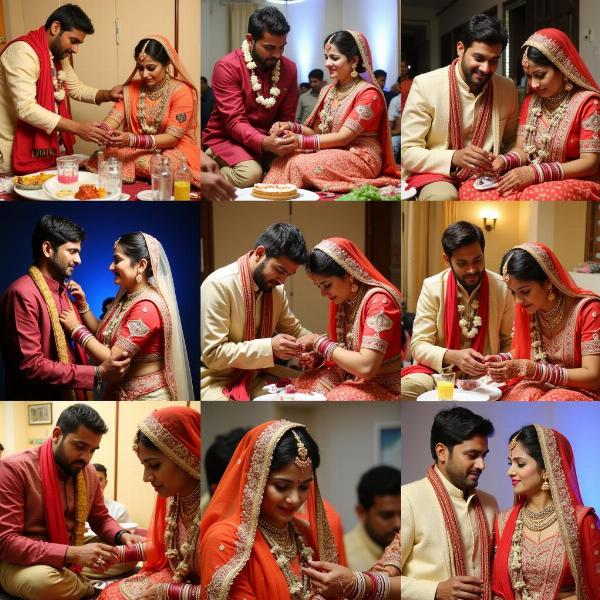Solemnisation, a word often encountered in legal and ceremonial contexts, signifies the act of making something formal and official, especially a marriage. Understanding its meaning and implications, particularly within the Indian cultural context, is crucial for anyone navigating legal or personal matters. This guide will explore the “solemnisation meaning in Hindi,” its cultural significance, legal implications, and common practices.
Understanding “Solemnisation” in the Indian Context
In India, marriage is considered a sacred union, often deeply rooted in religious and cultural traditions. While the legal aspect of marriage requires registration, the solemnisation ceremony holds immense cultural significance, marking the public acknowledgement and acceptance of the union. “Solemnisation meaning in Hindi” can be understood through several terms, each carrying nuances of tradition and ritual. Words like “विवाह संस्कार” (Vivah Sanskar), “विवाह समारोह” (Vivah Samaroh), and “शादी की रस्म” (Shaadi ki Rasam) all convey the sense of a formal ceremony marking the beginning of a marital relationship.
What Does Solemnisation Entail?
Solemnisation involves specific rituals and customs varying across different religions and regions in India. Typically, it involves the presence of family, friends, and community members as witnesses to the union. Religious ceremonies might include chanting mantras, exchanging vows, and performing specific rites dictated by tradition. Legal solemnisation, on the other hand, requires adhering to the Special Marriage Act, 1954, or respective personal laws governing different religious communities.
Legal Implications of Solemnisation in India
While cultural traditions play a significant role, the legal aspect of solemnisation is equally important. Under Indian law, marriage becomes legally valid only after proper registration. The Hindu Marriage Act, 1955, governs Hindu marriages, while the Muslim Personal Law (Shariat) Application Act, 1937, applies to Muslim marriages. For inter-religious or inter-caste marriages, the Special Marriage Act provides a secular framework for registration. Understanding the specific legal requirements based on one’s religion and circumstances is essential for a legally recognized marriage.
Solemnisation under the Special Marriage Act
The Special Marriage Act offers a secular option for couples from different religious backgrounds. It requires a notice of intended marriage to be published, followed by a 30-day waiting period. After this period, the marriage can be solemnised in the presence of a Marriage Officer and three witnesses. This process simplifies inter-faith marriages and offers a legal framework outside religious customs.
Cultural Significance of Solemnisation Across Different Religions
Solemnisation ceremonies vary significantly across different religions in India. Hindu weddings, for instance, are elaborate affairs, often involving multiple rituals spanning several days. Muslim weddings involve the “Nikah” ceremony, a contract signed between the bride and groom in the presence of witnesses. Christian weddings typically take place in a church, involving the exchange of vows and blessings from a priest. Understanding these cultural nuances adds depth to the “solemnisation meaning in Hindi” within different religious contexts.
How do different religions solemnise marriage?
- Hinduism: Involves rituals like Kanyadaan, Pheras, and Saptapadi, symbolizing the giving away of the bride, circling the sacred fire, and taking seven vows, respectively.
- Islam: The Nikah ceremony involves the signing of a marriage contract (Nikahnama) in the presence of witnesses and a Qazi (religious officiant).
- Christianity: Typically involves a church ceremony with the exchange of vows, blessings from a priest, and the exchange of rings.
- Sikhism: The Anand Karaj ceremony involves the couple circling the Guru Granth Sahib (holy scripture) four times, signifying their commitment to the Guru’s teachings.
 Religious Wedding Ceremonies in India
Religious Wedding Ceremonies in India
Conclusion: Understanding the Multifaceted Meaning of Solemnisation
Understanding “solemnisation meaning in Hindi” goes beyond a simple translation. It involves appreciating the cultural, religious, and legal implications associated with formalizing a marriage. Whether it’s the vibrant rituals of a Hindu wedding or the simple elegance of a court marriage, solemnisation marks a significant transition in life, signifying the beginning of a new chapter. This guide offers a comprehensive understanding of the multifaceted aspects of solemnisation in India.
FAQs
- What is the legal age for marriage in India? The legal age for marriage in India is 21 for men and 18 for women.
- Is registration mandatory after solemnisation? Yes, registration is mandatory for a marriage to be legally recognized in India.
- What documents are required for marriage registration? Required documents include proof of age, address, and photographs of the bride and groom. Specific requirements may vary based on the applicable marriage laws.
- Can a marriage be solemnised without a religious ceremony? Yes, marriages can be solemnised under the Special Marriage Act without a religious ceremony.
- What is the role of witnesses in solemnisation? Witnesses are required to attest to the marriage and sign the marriage registration documents.
- What is the significance of “Saptapadi” in Hindu weddings? Saptapadi involves taking seven vows around the sacred fire, signifying the couple’s commitment to each other.
- What is the difference between a religious and a civil marriage? A religious marriage is based on religious customs and traditions, while a civil marriage is a legal contract registered under the Special Marriage Act.
Meaning-Hindi.in is your trusted partner for all your Hindi translation needs. We offer expert translation services for various documents, including legal, business, technical, and academic materials. Our team of experienced translators ensures accurate and culturally sensitive translations, bridging the language gap and facilitating seamless communication. Need help with document translation or understanding legal procedures related to marriage? Contact us today! Email: [email protected], Phone: +91 11-4502-7584. Meaning-Hindi.in – Your gateway to understanding Hindi.